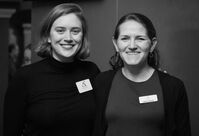 On February 19, Dr. Rob Davies, spoke to a packed audience (700+!) at the Wilma Theater about the scale of the planetary crisis and the urgent action needed to address it. Suffice to say, we were blown away by his presentation - and we’ve seen our share of climate talks. If you weren’t at the Big Event, we highly recommend watching the video of Rob’s presentation HERE (thanks, MCAT!). And, check out our post-event page with a whole slew of ideas for how to ACT, ADVOCATE, and ASSIST others. We’ve been thinking about the presentation A LOT since we’ve seen it, and thought we’d share some of our big takeaways in the form of a conversation between Caroline and Abby. And we’d love to hear your takeaways, too! Abby: Well, that wasn’t your average climate talk. What were the things that stuck with you? Caroline: So many things! Davies really made clear the need for both individual and systemic change, especially in the United States. My favorite statistic spoke to this - if we took the planet’s total carbon budget (how much we can emit and still get to zero by mid-century) and divided it by the world’s population, each of us would have 44 tons of carbon as our lifetime’s budget. The average American would use their budget in 2.5 years. Abby: Yikes. That’s crazy. Caroline: I know. I heard this and thought, ‘Well, we all need to shrink our footprints as close to zero as possible,” but then Davies hit us with another incredible fact. If the average American were to never turn on their heat, drive their car, or use fossil fuels in any way, each person would still burn through 6 tons of carbon per year. As Davies put it, even if we were to go into our basements tonight and decompose on some garden seeds, we only buy ourselves an extra 5 years. This is because of the systems around us and the infrastructure that has been built to support the way we live. We need individual change, but it only gets us so far. We desperately need structural change, too. Abby: Absolutely. Endless growth can’t be our global economic ideal anymore. That’s not politics, it’s just physics. Rob really nailed home that point - he actually called growth a “pathology” underlying the symptom of climate change. But he also gave us a hint as to what a more sustainable level of consumption could look like, which helped me put this in perspective. Global emissions would drop by a third if us wealthy high-emitters were to adopt a lifestyle more like that of the average European citizen. Or as Rob put it, for those of us in the top 20 percent of global material and energy consumption (virtually all Americans) that produce 80 percent of global carbon emissions, “there’s a lot of slush at the top” that can be cut without reducing our quality of life. If our goal is not growth but a society and planet that is sustainable, just, and vibrant, making the necessary changes will be hard but maybe not as scary as one might think. Caroline: No, not as scary. But we certainly need to avoid the tipping points that he described. Abby: For sure. That was one of the truly astonishing things Rob communicated in his presentation: we’re approaching tipping points not just in our climate system, but in ALL systems that support life: air, water, soil. Crossing the threshhold of these tipping points would unleash global, catastrophic disruption. Rob pointed out that catastrophic means something very specific in the science community: unadaptable. And some people in some places are already experiencing such catastrophic, unadaptable changes, but there is still time to avoid tipping points that would lead to such disruption across the globe. It’s a difference between a planet that is livable and one that is unadaptable. Caroline: Yeah, it’s hard to hear that, but important to know the reality of the situation we’re in, so we can respond in a way that meets the moment. Abby: Exactly. And I don’t know about you, but Rob’s description about how to respond to the climate emergency was maybe the most powerful piece of his whole talk, which is saying something. Caroline: I totally agree. Davies talked about a shift from a mindset of hope/despair, to one of resolve and determination. So often I have wanted to ask climate scientists and activists, “Are you hopeful?” Maybe this is the wrong question. “Hope isn’t free,” said Davies. If we want hope, we have to act - not the other way around. We must be resolved to “take the next step,” even if we cannot see the entire path to the top of the mountain. This reframing has made it easier for me to take action even on the days when I am sad, scared, or anxious. Abby: Exactly. It is reasonable to feel daunted by the challenge in front of us. But knowing that we are in a climate emergency changes our mindset about our response, and can actually help us take action. It was so helpful to hear Davies put it this way: “When you’re in a burning building, you don’t waste time hoping or despairing, you just get out. You take the next step, then the next step, then the next. It’s about absolute, unwavering resolve and commitment.” Caroline: And I loved this idea: that in an emergency, what once may have been radical, is now rational. And what is necessary becomes what is viable. Abby: Yes! That was a revelation. Any other revelations? Caroline: Lately I’ve been reflecting on Davies’ presentation in the context of a book I recently finished, We are the Weather by Jonathan Safran Foer. Foer references the Bible - go with me here - where there are several moments when God asks people where they are. Foer writes, “His questions are not about the location of a body in space but about the location of a self within a person,” and he points to our own modern day versions of this, when we ask people where they were at pivotal moments in our shared history: the assassination of John F. Kennedy, the fall of the Berlin Wall, or September 11th. “As with God in the Bible, we are not really trying to establish someone’s coordinates. We are asking something deeper about their connection to the moment, with the hope of situating our own...Future generations will almost certainly look back and wonder where we were in the biblical sense: Where was our selfhood? What decisions did the crisis inspire?” I hope one day we’ll ask: Where were you when you made your decision to take the next step to address the climate emergency? Abby: I hope that, at least for some of those in the audience, they can mark February 19th at the Wilma as one of those decision points. I know I’ve had those moments that have given me the resolve to continue doing this work, and Rob’s presentation was definitely one of them. Caroline: Any last thoughts? Abby: So many - but I’ll just mention one more! I read a quote the other day by the author Rebecca Solnit, from her book Hope in the Dark. It said, “Inside the word ‘emergency" is ‘emerge’; from an emergency new things come forth. The old certainties are crumbling fast, but danger and possibility are sisters.” That’s what Rob’s presentation was all about. Every day we are resolved to take the next step, we show that a livable future is possible.
1 Comment
|
AuthorsAbby Huseth Archives
July 2024
Categories
All
|

 RSS Feed
RSS Feed


